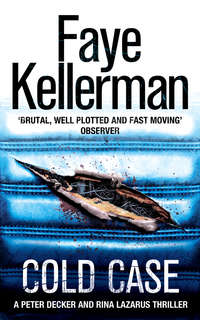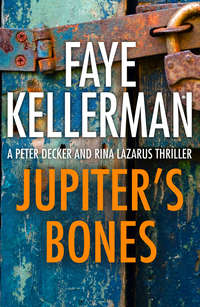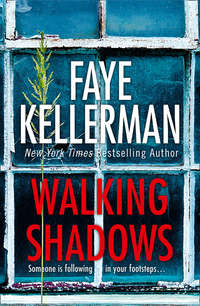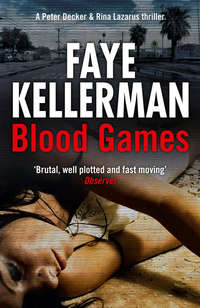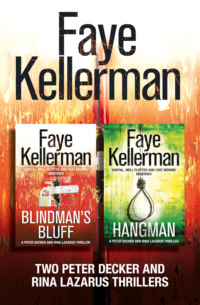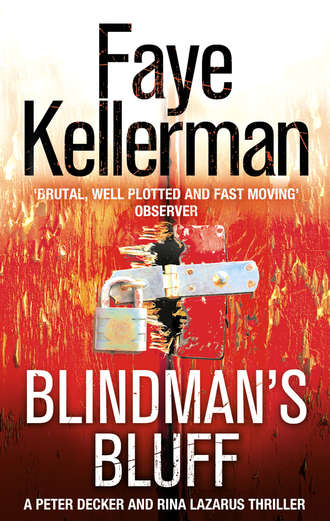
Полная версия
Blindman’s Bluff
“Dad’s a workaholic,” Grant told him. “He not only keeps long hours, he expects everyone else to keep long hours.”
“Is that a problem?” Marge asked.
“Not with us, because we’re three thousand miles away,” Grant said. “My brother gets the brunt end. Dad accuses us of being soft because we have a life. But that’s just Dad being Dad.” Tears formed in his eyes. “Dad came from humble beginnings.”
“We both did,” Mace said with a bristle. “My father came over from Europe with nothing. He opened a small appliance repair shop back when people still repaired things. He was frugal and saved and managed to buy a couple of apartment buildings. Guy and I parlayed our dad’s holdings into an empire.”
Grant gave his uncle a hard stare and then turned his irritation on Decker. “What does this have to do with his murder?”
“Just trying to get a feel for your family, Mr. Kaffey. It helps to know some background. I’m sorry if you find the questions intrusive.”
Marge stepped in. “Was your father having problems with anything specific? Maybe the embezzling accountant?”
“He was actually an account executive,” Mace said. “Milfred Connors. I think there was talk of a lawsuit, but Guy paid him off.”
“Son of a bitch,” Grant said. “He steals and then he threatens to sue.”
Marge wrote down the name. “So why pay him off?”
“Because it’s easier than a protracted legal battle,” Mace told her.
Grant said, “We had enough lawsuits going already.” He backtracked. “Nothing out of the ordinary. Some we initiated. Some were initiated against us.”
Mace said, “What about Cyclone Inc., Grant? They were really pissed when we pulled the permits for the Greenridge Project.” He turned to Decker. “They’ve been impeding the project for years. We finally got all the permits and approvals, so they don’t have a leg to stand on.”
Decker said, “Why is Cyclone Inc. pissed at you?”
Grant said, “They own the Percivil Galleria and Bennington Mall—both of which have been around for twenty or thirty years. Bennington was knocked for a loop by the Woodbury Commons—one of the busiest outlet malls in the country. But Percivil was doing all right because it’s across the Hudson where there isn’t competition.”
“Then we came on the scene,” Mace said. “Kaffey is developing a state-of-the-art mall that’s going to blow the Galleria out of the water.”
Grant said, “Not only will it include almost every chain and luxury goods store, we’re in the process of developing a resort hotel with two Tumi Addams-designed golf courses.”
Mace said, “One indoors, one outdoors.”
“Golf year-round. Plus we’ve signed on with some of the country’s best chefs to open up restaurants.”
“Wow,” Marge said. “That would blow any existing mall away.”
“Exactly!” Mace crowed.
Decker asked, “Where exactly is the development?”
“Upstate New York in Clarence County surrounded by some of the most beautiful land that ever existed,” Mace said. “The area is filled with ecological nuts, but we did our due diligence. We’ve filed all the necessary environmental impact reports. The whole project is going to be green.”
“Cyclone’s been raising a stink about graft and corruption,” Grant said. “Totally unfounded accusations. Assholes! They’ve already sicced the county tax assessors on our books. We came away clean. We’ve got nothing to hide!”
“Who’s the CEO of Cyclone?” Decker asked.
“Paul Pritchard.” Grant paused. “He’s an asshole, but murder?”
Mace said, “Our project will kill his last profitable mall, Grant. Pritchard’s a bastard, and I wouldn’t put anything past him.” He turned to Decker. “Check him out.”
“We will,” Marge said. “Getting back to the more immediate, does Gil live near your father?”
“Gil lives in L.A. Dad lives on the ranch and in Palos Verde Peninsula. The company is headquartered in Irvine.”
Decker raised an eyebrow. “Not so far from Palos Verdes but far from Coyote Ranch.”
“That was the purpose,” Grant said. “When Dad wanted to get away, he wanted to get away. Initially he bought the property for Mom and her horses, but Dad came to love it. Mostly they entertained at the Palos Verdes house, but every so often they’d give a party at the ranch.” His eyes looked far away. “One winter”—a laugh—“Dad got some snow machines and provided skiing on several man-made runs. The party lasted an entire weekend. That was something else.”
“Was the ranch’s security beefed up for the weekend?” Marge asked.
“Probably. That would be Neptune Brady’s bailiwick. He knew the ins and outs of the ranch better than my parents. Fuckhead! How the hell did this happen? He’s the one you should be questioning, not me.”
Decker said, “He’s on our radar. So far, he’s been cooperative.”
Grant became agitated. “Where the fuck is that doctor? I want to see my brother!”
“Let me go check on it,” Marge said.
“Good idea.” Decker turned to the men. “Thank you both for being so forthright at this very difficult time.”
“Fucking nightmare!” Grant tried to pace, but there wasn’t much floor space. Talking business had seemed to calm him down, giving him something else to think about. The minute he was brought back into his current tragedy, he was perched on the edge of an explosion. And who could blame him?
Decker said, “Do you think that the Greenridge Project will go through in the wake of this tragedy?”
“Absolutely,” Mace said stiffly. “One thing has nothing to do with the other.”
“It’s just that Guy was the CEO, and a project of that magnitude is a mammoth enterprise. It sounds like the biggest shopping mall that Kaffey has developed.”
Grant said, “It’ll be difficult, but we can carry out Greenridge without Dad as long as Gil can take care of the rest of Kaffey.” He shook his head. “God, that’s a huge load.”
Mace said, “It’ll be hard to handle anything without Guy, but we can manage if we work together. We’re not just business associates, we’re family.”
Decker regarded Guy’s younger brother. His pep talk sounded forced—maybe trying to convince himself he was up to the job. Marge came back into the room. “Dr. Rain is just out of surgery. He’ll see you both in his office as soon as he’s cleaned up. Nurse Edderly will be happy to take you to his office.”
Grant punched a fist into his palm. “I don’t want anything to do with that bitch!”
“I’ll be happy to take you,” Marge said.
“Thank you,” Mace said. “Are you staying with us?”
“We need to get back to the ranch.” To the crime scene, Decker thought. “I also want to check out these two men you mentioned—Paul Pritchard and Milfred Connors.”
“Connors was a low-level con man,” Grant said. “He’s a nothing.”
“Sometimes it’s the nothings who get pissed off,” Mace told him.
“Exactly,” Decker said. “Here are some business cards, gentlemen. Call me anytime.”
“And here’s my card,” Grant countered. “That’s a business number. You can call it anytime. If it’s important, you can leave your number and I’ll be paged.”
“Thank you,” Decker said. “Uh…just one last question. Do either of you know Spanish?”
“What?” Mace said.
“What’s that about?” Grant asked.
“A lot of people who work at the ranch are Hispanic. In California, Hispanics do a lot of construction work. Just wondering if you and your dad and your brother can communicate with them directly.”
“Of course we visit the job sites, but we don’t talk directly to the men,” Mace told him.
“Why would we do that?” Grant asked. “That’s why we employ foremen.”
SIX
ONCE BEHIND THE wheel, Marge got comfortable in her seat and spoke while adjusting the mirrors. “I’d love to see the company’s financials on Greenridge, especially in this current climate. Sounds like something that was born in real estate boomland and is currently moribund in bustville.”
“Maybe they already had the financing for the project.”
“Something that big, including a hotel? That’s a cool billion, right?”
“Too many zeroes and I get confused.” Decker opened a bottle of water and chugged half of it. “Even if I had the financials, I wouldn’t even begin to know how to interpret something that complicated.”
Marge started the motor and drove out of the underground lot. “Do you think that the project might have something to do with the murders?”
“It’s worth checking out, but I don’t expect anything.” Decker closed the cap. “Let’s concentrate on what we do know.”
“We have murdered guards and we have missing guards. Sounds like an inside job.”
“Two things come to mind,” Decker said. “An inside robbery job that was botched or an inside job where the guards were used in a murder for hire.”
“In which case, we need to look deeper into the family.”
Decker said, “What did you think of Grant?”
“Intense. He did most of the talking for his uncle.”
“What do you think about Mace?”
“Not as much intense. We didn’t know Guy Kaffey, but from today’s conversation snippets, I’d say that younger brother Mace grew up under the shadow of Guy.”
Decker said, “Grant’s also the younger brother and you just described him as intense.”
“Yeah, he’s aggressive. But maybe Gil is even more aggressive. All I’m saying is that if Guy and Mace clashed, we both know who’d come out ahead. I wonder if Guy Kaffey was as enthusiastic on the Greenridge Project as Mace and Grant are.”
“Guy was about to pull the plug and the two New Yorkers weren’t happy with his decision?”
“My thoughts exactly,” Marge said. “But even if that were the case, would that generate enough anger and hostility in Grant for him to kill his parents?”
Decker said, “We don’t really know how Grant feels about his parents. There could have been a lot of playacting going on.”
“True that,” Marge said. “Interesting that you didn’t ask if there was enough anger and hostility for Mace to kill a brother.”
“Cain and Abel,” Decker said. “The very first chapter. There are four recorded people on the newly minted universe and bam, one brother shoots the other because of jealousy. What does that say about the human race?”
“Doesn’t say too much for us or for the Big Cheese in the sky,” Marge noted. “Any police chief who ran a major city with a 25 percent homicide rate would get his ass canned in an eye blink.”
THE MAN CALLED into the witness box was Hispanic.
No surprise there.
The entire afternoon had been a parade of Hispanics from the plaintiff—a beefy guy with tattoos—to the defendant—another beefy guy with tattoos. Rina could sum up the assortment of alleged assaults and batteries in one word.
Alcohol.
All the participants had been drunk at the time, both the ladies as well as the gents. Normally the melee would have been forgotten about the next day, but the police happened to be cruising by when the slugfest had been in full force. The cops managed to arrest whoever didn’t scatter fast with the unlucky remaining souls blaming each one for starting the incident. Witnesses had suddenly come down with bad memories caused by cold feet.
The current participant in the witness box proved to be no exception.
At least, the jury finally figured out who Smiling Tom Cruise was.
When the first witness was called to the stand—a Hispanic woman in her fifties wearing a red miniskirt and with permanently inked eyebrows and a mane of long black hair—Smiling Tom, who had been sitting in the gallery, whipped out an electronic device. Walking slowing toward his destination, Tom held a small PDA in his hand, listening intently to something through an ear pod. When he reached the witness box, Tom turned off the radio and pulled out the earphone, stowing both in his front pocket.
The group exchanged glances and shrugged.
He sat himself directly behind the witness, his head leaning over the hoochie mama’s shoulder. The witness seemed to enjoy his presence, turning to him and gracing Mr. Sunglasses with a wide, white smile. For once, Tom didn’t smile back.
The case continued and Tom’s purpose became clear.
He was a translator.
To call him a translator was an understatement.
What Tom did was act out the testimony. He was a one-man stage show, his voice rising and falling, imparting each phrase with the exact amount of emotion required. If there was an Oscar for translators, Sunglasses Tom would have won it hands down.
As the afternoon hours passed, the witnesses’ recollections got more faint and indistinct and Arturo Gutierrez, now being grilled mercilessly by a hard-driving prosecutor in a red power suit, was more of the same. Although he did remember punches being thrown, he couldn’t tell who threw the punches. Maybe the plaintiff hit the defendant, but maybe the defendant hit the plaintiff. The witnesses were tentative on the stand, and the only one having a good time seemed to be Tom.
By the time the prosecution rested and the defense was due up, it was time to go home. After receiving their orders not to talk or discuss the case with anyone, the jury slowly and silently filed out of the courtroom as the bailiff looked them over one by one by one. Rina was reminded of the metaphor used on the holiday of Rosh Hashanah, the Jewish New Year’s. God judges all his people as they pass under him one by one—as if he were counting a flock of sheep.
Once in the hallway, the group made a break for the elevators.
Joy turned to Rina. “We’re going out for drinks. Wanna come?”
“My daughter has a choir recital.”
“When?” Kate asked.
“Around seven-thirty.”
“We’re only going out for about an hour.”
“Maybe tomorrow,” Rina said. “It’s going to take me a little time to get home, and I want to pack dinner for my husband. I’m meeting him at the recital.”
Joy said, “Well, aren’t you the nice wife!”
“Sometimes when he’s working big homicides and he’s been up for about twenty hours, he forgets to eat.”
No one spoke and the elevator doors opened and the group got out.
Ally said, “What do you think Smiling Tom was doing with his PDA?”
“I thought about that, too,” Rina said. “Maybe going over testimony before he translated it. Whatever he was listening to, it had to have been sanctioned by the court. No one would be that brazen to approach the witness box listening to music.”
“Good call,” Ryan told her.
Joy said, “He looks pretty damn brazen to me.”
“Yes, he was rather theatrical.” Rina opened the double glass doors to freedom. “I’m on for lunch tomorrow.”
“Great,” Kate said. “We’ll see you then. Wish your husband good luck.”
“Yeah, pump him for some juicy details,” Joy interjected.
“He’s pretty tight-lipped, but I’ll do what I can.”
Joy was pleased with Rina’s answer. She added, “And as long as you’re packing something for him, pack something for me. Whatever you ate this afternoon looked a hell of a lot better than the swill I had.”
ALTHOUGH RINA WAS early, Peter was earlier. While all the other parents were crowded toward the front, Peter had chosen a seat in an empty back row, sitting straight up with his head back, his eyes closed, and his mouth slightly open. She climbed over the folding chairs and gently shook his shoulder. He gave a snort at the same time his eyes popped open. “What?”
Rina took out a sandwich. “Here.”
Decker rubbed his eyes and stretched. “Hi, darlin’.” He leaned over and gave her a peck on the cheek. “Do you have something to drink? My mouth feels like cotton.”
“Caffeinated or decaf?”
“Doesn’t matter. I won’t have any trouble sleeping tonight.”
She handed him a can of Coke Zero. “It’s turkey and pastrami on a baguette.”
“I’m starved.” Decker took a bite. “It’s delicious. Thank you.”
“You haven’t eaten?”
“No.” He popped open the Coke Zero and downed the entire can, and immediately Rina handed him a caffeine-free Diet Coke. “I think I’m dehydrated.”
“I also have water if you want.”
“A little later, thanks.” He finished half the can. “How was your day in criminal justice?”
“Fine. How was yours?”
“Awful.”
“The murders are all over the news.”
“So I’ve heard.”
“Some guards were killed as well?” Rina asked.
Decker nodded and finished the Coke. “I must thank Hannah for getting me out of the squad room. I left in a hurry. Things are a mess.”
“Are you going back?”
“Probably. I’d like to finish some of my paperwork and strategize.”
Rina knew from experience that multiple murders mean multiple, multiple suspects. “Are you awake enough to drive, Peter?”
“I’m fine.” He smiled to prove the point. “Really, I’m fine. I was probably out for around twenty minutes. I feel remarkably refreshed.”
“One of my fellow jurors wants to know all the juicy details of the Kaffey homicides.”
“Tell her to read the papers.”
“I shall.” Rina took Peter’s hand. “I’m glad you made it to the concert. Hannah made a point of asking about you.”
“Lord only knows why. She hides herself as much as possible in the back row. I wouldn’t even notice her except that she’s tall. She never has any solos. Does the teacher have something against her?”
“Mrs. Kent is Hannah’s biggest fan.”
“So why doesn’t she ever have a solo?”
“I don’t think she wants one. She likes to see her father in the audience. It makes her feel like you care.”
Decker shrugged. “I keep wondering with the kids, including Cindy who is in her midthirties, how long will I have to jump through hoops just to prove I love them?”
“Oh, I don’t know…” Rina shrugged. “Probably the rest of our lives.”
SEVEN
DECKER WAS DEAD to the world from twelve midnight until six-thirty the next morning when the alarm rang out. The bed was empty, but he heard noises coming from the kitchen. He showered and shaved and dressed and walked into the breakfast room at seven where coffee was already brewing.
“Good morning,” Rina said. “How do you feel?”
“Not too bad.” He poured a cup of java from the drip machine and took a sip. “Wow, that’s good. Do you want me to wake up the princess?”
“I’ve already done that. She’s in a good mood.”
“What’s the occasion?”
“You. She told me—and I quote—‘It was really nice for Abba to show up. I know he must be swamped at work.’”
“That’s lovely.” A pause. “How long do you think her appreciation will last?”
“In the short run, it won’t last very long at all. But in reality, it’ll last a lifetime.” Rina kissed his cheek. “I’ll take her to school on my way to court.”
“That would be great.” He checked his watch. “I need to go. I’ll stick my head in the lion’s den and say good-bye.”
“This morning, you’ll probably have more of a lamb than a lion.”
“Whatever I get is fine.” He put down his mug. “She’s a good girl. She’s my baby and I love her dearly. If I’m a safe target for some of her frustration, so be it. If God’ll just keep her safe, I’ll take all those slings and arrows.”
OLIVER KNOCKED ON the doorjamb and without waiting for an invitation, he walked into Decker’s office. He had a mug of coffee in one hand and was holding a sheet of paper in the other. The man looked positively drained.
“Get any sleep last night, Oliver?”
“A couple of hours, but I’ll be all right.” He handed Decker a neatly typed up paper that resembled a family tree. “I’ve outlined Kaffey Security 101. If you look at the top of the sheet, I have Neptune Brady in the starring position because he’s the head honcho. Then I branch off.”
“Well done,” Decker said.
“Not too bad for a zombie.” Oliver smiled. “I divided it into two categories—guards at the ranch and personal bodyguards. Personal bodyguards—which I’ve abbreviated as PBG—are or were used mainly when Guy and Gilliam went out in public—restaurants, charity functions, business functions, parties. At least one PBG was with them at all times.”
“What about if they went out individually?”
“Don’t know about Gilliam, but there was definitely one on Guy. When no one was home, the security guards, or SG, watched the properties. So far I got fourteen names, but you can see there’s overlap. Rondo Martin, Joe Pine, Francisco Cortez, Terry Wexford, Martin Cruces, Denny Orlando, Javier Beltran, and Piet Kotsky worked as personal bodyguards and security guards.”
Decker regarded the paper. “You’ve crossed off Alfonso Lanz and Evan Teasdale. Those are the dead guards, right?”
“Yep.”
“And these circled names—Rondo Martin and Denny Orlando—they’re the missing guards?”
“Right again. No luck locating them yet, but we’ve been doing some hunting. When we went to pay a visit to Denny Orlando’s apartment, his entire family was there, waiting for Denny to come home. Marge and I talked to the wife for a while. She described Denny as a good husband, a good father—they have two kids—and said it’s not like Denny to up and disappear.”
“That means nothing.”
“I agree. He still needs to be probed, but you get that initial feeling about a person. Sometimes it’s wrong but more often than not, it’s right. We didn’t find anything that points Denny in the direction of hit man. When we asked Brady about him, he seemed stunned. Denny always impressed Brady as a straight shooter. He’s a deacon in his church.”
“So was BTK.”
“Yeah, I know, but I think we all agree that this probably isn’t the work of a serial killer.”
“What about the other one—Rondo Martin?”
“Brady was equally shocked, but of course, he has to be. He can’t admit to us that he hired a psycho.”
“You think he’s a psycho?”
“He’s a former deputy sheriff from Ponceville—a small farm community in central California. Brady wasn’t sure how Rondo heard about the position for the Kaffeys, but he called Brady and told him he was interested in private security work. The pay was better and he was looking for something different. He was interviewed, went through a probationary period, and then was hired full-time. Moved down to L.A. with no strings attached.”
“Hmmm…”
“Exactly. He lives in an apartment in the North Valley. When we went to his place, no one was home, but we got the keys from his landlord. His place, while not exactly stripped cleaned, was pretty damn bare. His car was also gone—an ’02 Toyota Corolla—metallic blue. We’ve got an APB out on it.”
“What about Orlando’s car?”
“His wife took him to work. Martin was supposed to take him back home.”
“So what are your thoughts?”
Scott ticked off his fingers. “Orlando and Martin were both in volved. Martin was involved and shot Orlando. Orlando was involved and shot Martin. Neither was involved and both bolted because they were scared.”
“What about prints? You pulled up a lot of them.”
“We’re checking them out.”
“You have prints for Martin and Orlando?”
“Orlando, I don’t know. We’ve put in a request at Ponceville for Martin’s prints. He must have had a set to work in law enforcement.”
“What about the other guards?” Decker asked.
“We’re running through them one by one. We made phone contact with Terry Wexford, Martin Cruces, and Javier Beltran so we’re on our way to eliminating them. Let me recap the way the system works.”
Decker sipped coffee at his desk. “Shoot.”
“There are always four security guards working at the ranch when Gilliam and Guy are in residence—two at the guardhouse and two inside the house. The men work twenty-four-hour shifts and are relieved by a new set of guards the next day. Sometimes individuals from the next group might come in a little early. So theoretically, it’s possible to have as many as eight guards on the property at any one time.”


